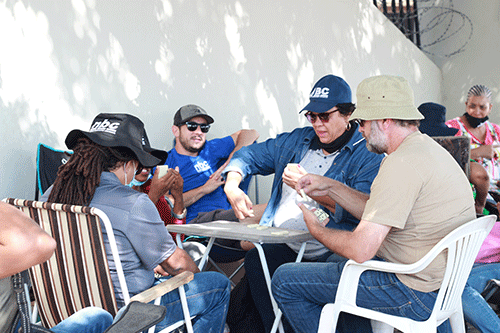The ongoing strike action undertaken by hundreds of Namibian Broadcasting Corporation employees is being felt across the length and breadth of the country.
Radio remains the most reliable, affordable, accessible and timely medium of communication used to reach a large number of audiences in Namibia.
However, with the NBC workers being on strike since last week over better pay and working conditions, people have been negatively affected, especially the masses who depend on this medium for various announcements and communication daily.
Another negative effect felt across Namibia due to the NBC strike is the Covid-19 daily update via the Government Information Centre that the national broadcaster has been airing since the announcement of the pandemic in 2020.
When the workers started the industrial action last Thursday, they said they would not compromise on their demands.
However, NBC management and the board yesterday pleaded with workers to return to work while an amicable solution is being sought.
They are demanding an 8% pay rise, and an increase in transport, accommodation and medical aid allowances.
They also want workers who have been on monthly contracts to be offered permanent contracts, the purchasing of more modern equipment, and better working conditions.
New Era engaged constituency councillors in various regions who frequently use NBC’s indigenous language radio services to communicate their plans, announcements and government activities on how the strike has affected them in reaching out to the masses they represent.
Karibib councillor Melania Ndjago said the national radio strike has caused great disruption to their developmental programmes with the people they represent.
“Communication is life, and is the source of our life. Without communication in our rural regions, productivity is dead. Efficiency and effectiveness are killed,” she observed.
Ndjago stressed that labour issues must be settled fairly, generously, and with dignity.
“Workers are not slaves. Slavery is abolished by Article 9 of the Constitution and the Labour Act. The employer must provide a reasonable salary and better working conditions, and a healthy and safe environment at work. Therefore, the relationship between the employer and employee must be based on good faith, teamwork, integrity, responsiveness, responsibility and accountability. I beg the employer and the employee to bargain in good faith. Negotiate. Negotiate. Negotiate please, and find solutions soon,” she pleaded.
Otjinene constituency councillor Erwin Katjizeu viewed NBC radio and television as their main modes of communication, and that this strike has left their community in the dark, especially during the times of this Covid-19 pandemic.
“Otjinene has started with its vaccinations programme this week, and due to the strike, we couldn’t get the message across as the aim is to get as many people vaccinated, nor could we as councillors get important messages across to our communities,” he stated.
Katjizeu is nonetheless hopeful that the NBC board and the line ministry would find an amicable solution soon. According to him, one has to blame the people who were negotiating on behalf of the NBC into ‘forcing’ the staff to vote in favour of the strike, as it has left many Namibians in the dark when it comes to important information.
“I hope and wish for a speedy resolution, and that the NBC will be back on air and back to normal,” said Katjizeu.
Kabbe South’s John Likando said the people in his area depend on radio for communication as the network coverage is poor in many constituencies.
“It benefits us because it connects us to the masses. Traditionally, people listen to the radio. We had a visit by President Hage Geingob in Impalila, but we could not inform the public on his visit,” he continued.
Councillor Andreas Amundjindi of the Uukwiyu-Uushona constituency in the Oshana region says the strike has affected them in terms of communicating morning announcements on the happenings or developments in their constituency and elsewhere.
“It is now hard to communicate to the people, especially when we have to caution them on the dangers posed by road construction projects and other important announcements. We can’t even announce the pay points for our pensioners. The police are also affected because they can’t use the radio platform to give an update on safety and security issues around Namibia. We are really in a dilemma,” he moaned.
Omuntele councillor Sacky Nangula said everybody is affected by the strike because there is no communication of important information, especially on Covid-19 and the vaccination exercise being rolled out.
“People need to be educated about Covid-19 through the radio. Even if we want to address the villagers, there is no way to communicate to them about such meetings. We have senior citizens who depend on the radio for deaths and other important announcements. What does it mean for us as a nation?” he queried.
anakale@nepc.com.na


